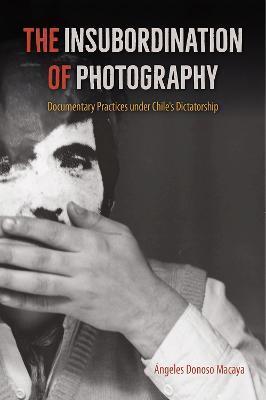The Insubordination of Photography: Documentary Practices under Chile's Dictatorship

The Insubordination of Photography: Documentary Practices under Chile's Dictatorship
Latin American Studies Association Visual Culture Section Best Book Prize
Latin American Studies Association Historia Reciente y Memoria Section Best Book Prize
The role of documentary photography in exposing and protesting the crimes of a dictatorship
After Augusto Pinochet rose to power in Chile in 1973, his government abducted, abused, and executed thousands of his political opponents. The Insubordination of Photography is the first book to analyze how various collectives, organizations, and independent media used photography to expose and protest the crimes of Pinochet's authoritarian regime.
Ángeles Donoso Macaya discusses the ways human rights groups such as the Vicariate of Solidarity used portraits of missing persons in order to make forced disappearances visible. She also calls attention to forensic photographs that served as incriminating evidence of government killings in the landmark Lonquén case. Donoso Macaya argues that the field of documentary photography in Chile was challenged and shaped by the precariousness of the nation's politics and economics and shows how photojournalists found creative ways to challenge limitations imposed on the freedom of the press.
In a culture saturated by disinformation and cover-ups and restricted by repression and censorship, photography became an essential tool to bring the truth to light. Featuring never-before-seen photographs and other archival material, this book reflects on the integral role of images in public memory and issues of reparation and justice.
A volume in the series Reframing Media, Technology, and Culture in Latin/o America, edited by Héctor Fernández L'Hoeste and Juan Carlos Rodríguez
Publication of the paperback edition made possible by a Sustaining the Humanities through the American Rescue Plan grant from the National Endowment for the Humanities.
PRP: 173.60 Lei
Acesta este Prețul Recomandat de Producător. Prețul de vânzare al produsului este afișat mai jos.
138.88Lei
138.88Lei
173.60 LeiLivrare in 2-4 saptamani
Descrierea produsului
Latin American Studies Association Visual Culture Section Best Book Prize
Latin American Studies Association Historia Reciente y Memoria Section Best Book Prize
The role of documentary photography in exposing and protesting the crimes of a dictatorship
After Augusto Pinochet rose to power in Chile in 1973, his government abducted, abused, and executed thousands of his political opponents. The Insubordination of Photography is the first book to analyze how various collectives, organizations, and independent media used photography to expose and protest the crimes of Pinochet's authoritarian regime.
Ángeles Donoso Macaya discusses the ways human rights groups such as the Vicariate of Solidarity used portraits of missing persons in order to make forced disappearances visible. She also calls attention to forensic photographs that served as incriminating evidence of government killings in the landmark Lonquén case. Donoso Macaya argues that the field of documentary photography in Chile was challenged and shaped by the precariousness of the nation's politics and economics and shows how photojournalists found creative ways to challenge limitations imposed on the freedom of the press.
In a culture saturated by disinformation and cover-ups and restricted by repression and censorship, photography became an essential tool to bring the truth to light. Featuring never-before-seen photographs and other archival material, this book reflects on the integral role of images in public memory and issues of reparation and justice.
A volume in the series Reframing Media, Technology, and Culture in Latin/o America, edited by Héctor Fernández L'Hoeste and Juan Carlos Rodríguez
Publication of the paperback edition made possible by a Sustaining the Humanities through the American Rescue Plan grant from the National Endowment for the Humanities.
Detaliile produsului









